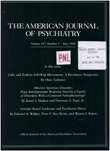Lack of efficacy of carbamazepine in the treatment of panic disorder
Abstract
The authors conducted a controlled study of carbamazepine in the treatment of 14 patients with panic disorder. Although there was a statistically significant reduction in symptoms of anxiety on several measures, only one of the patients was judged to have a marked and sustained clinical improvement while taking carbamazepine. Forty percent of the patients had a decrease in frequency of panic attacks during carbamazepine treatment, 50% had an increase, and 10% showed no change. The presence of either EEG abnormalities or prominent psychosensory symptoms did not predict response to carbamazepine. These findings are discussed within the context of an epileptiform model for panic disorder.
Access content
To read the fulltext, please use one of the options below to sign in or purchase access.- Personal login
- Institutional Login
- Sign in via OpenAthens
- Register for access
-
Please login/register if you wish to pair your device and check access availability.
Not a subscriber?
PsychiatryOnline subscription options offer access to the DSM-5 library, books, journals, CME, and patient resources. This all-in-one virtual library provides psychiatrists and mental health professionals with key resources for diagnosis, treatment, research, and professional development.
Need more help? PsychiatryOnline Customer Service may be reached by emailing [email protected] or by calling 800-368-5777 (in the U.S.) or 703-907-7322 (outside the U.S.).



